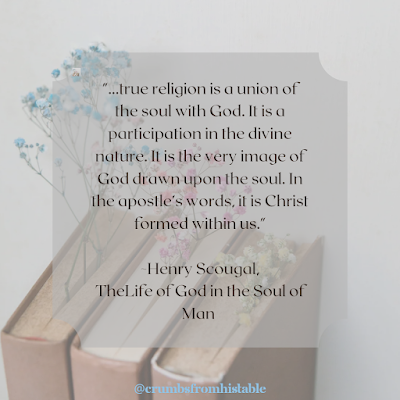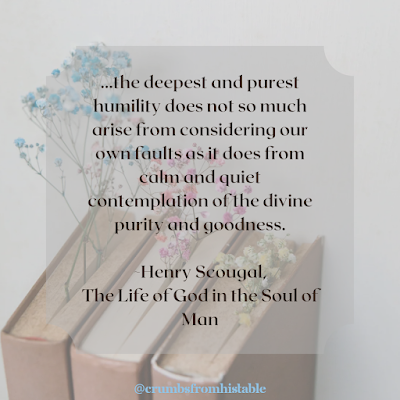 |
| "The worth and excellency of a soul is to be measured by the object of its love" (Henry Scougal, The Life of God in the Soul of Man). |
To them God chose to make known how great among the Gentiles are the riches of the glory of this mystery, which is Christ in you, the hope of glory" ( Colossians 1:27, ESV).
In a Nutshell
Henry Who?
What's It About?
True religion is quite another thing. Those who are acquainted with it will entertain far different thoughts about it and avoid all false imitations of it. They know by experience that true religion is a union of the soul with God. It is a participation in the divine nature. It is the very image of God drawn upon the soul. In the apostle’s words, it is Christ formed within us. In short, I do not know how the nature of religion can be more fully expressed than by calling it a divine life (Kindle location 137-154).
Again a little farther on, he writes, "Religion is a reflection of the divine perfections, the image of the Almighty shining in the soul of man. It is a real participation of his nature. It is a beam of the eternal light, a drop of that infinite ocean of goodness. And those who are endowed with it can be said to have God dwelling in their souls and Christ formed within them" (188).
This life, as he describes it (and I believe his thoughts conform to the Scriptures), is a life of mutual love between God and the Christian and between the Christian and his brother or neighbor; of holiness, since the holy Christ formed in us through the Holy Spirit makes us like the holy God; of humility, as we see our lives in the light of God's perfect holiness; of prayer.
Why Read It?
Perfect love is a kind of self-dereliction, an emptying out of ourselves. It is a kind of voluntary death wherein the lover dies to themselves and all their own interests, neither thinking nor caring about themselves any more, and being mindful of nothing other than how they may please and gratify the person whom they love. Thus they are quite undone unless they meet with reciprocal affection.… The God-directed lover has an unspeakable advantage, having placed his affection on him whose nature is love. For if God’s goodness is as infinite as his being, and his mercy saved us when we were his enemies, how can God not but choose to embrace us when we have become his friends! It is utterly impossible that he should deny his love to a soul who is wholly devoted to him and desires to serve and please him. He cannot disdain his own image nor the heart in which it is engraved. Love is the only tribute that we can pay him. It is the sacrifice that he cannot despise.… how happy are those who have placed their love on him who can never be absent from them! They only need to open their eyes and they may behold the traces of his presence and glory everywhere. To be able to converse in an instant with him whom their souls love transforms the darkest prison or wildest desert, making them not only bearable but almost delightful (450-466).
 |
The paragraph Nancy Wolgemuth quoted is no less lovely:
Let us consider the love and affection by which holy souls are united with God so that we may see the excellence and happiness that result from it. Love is the powerful and prevailing passion by which all of a person’s inclinations should be determined and on which perfection and happiness depend. The worth and excellency of a soul is to be measured by the object of its love (398).
While my edition came from Crossway and included a helpful foreword, a bit of subtle updating of language, and a Scripture index, free versions are available, given that the original is in the public domain. In my opinion, reading Scougal's small book amply repays the investment of time required, and should you disagree, you won't have lost much.
Potential Pitfalls
The Bottom Line
The Life of God in the Soul of Man is a beautiful little book on living the Christian life. Henry Scougal was an old soul indeed to have written such a gem of a treatise in his twenties. It is truly too glorious and beautiful and true to take in fully at one reading. This is a book worth returning to again and again and taking into one's heart. I hope you read it too. If you do, and if this review influenced that decision, please come back and let me know how you got on.























